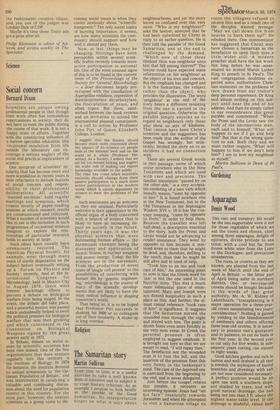Science
Social concern
Bernard Dixon
Scientists are unique among professional people in that though their work often has tremendous repercussions in society, they do not have to meet the public during the course of that work. It is not a happy state of affairs. Together with the constricting influence of a narrow specialist education, this vocational insulation from life outside the laboratory can encourage a serious neglect of the social and practical implications of science.
One symptom of scientists' insularity that has become more and more scandalous in recent years is their reluctance to include matters of social concern and responsibility in their piofessional deliberations. All scientific learned societies' hold regular meetings and symposia, which consist mostly of paper-reading sessions at which research results are communicated and criticised. What a number of scientists would like to see is the inclusion in such programmes of occasional sessions designed to explore the relationships of particular research fields to society at large. Such ideas have usually been strenuously resisted. The American Physical Society, for example, went through many years of sterile disputation on the subject before eventually setting up a 'Forum on Physics and Society' recently. And at the in ternational Congress for Microbiology, held in Mexico City in August 1970, there were frenetic backstage efforts to prevent a debate on biological warfare from being staged. In the event, the debate did take place, and a powerful motion was passed which undoubtedly helped to swell the political pressure for biological warfare that was then growing and which culminated in the Convention on Biological Weapons signed by the great, powers early in 1972.
In Britain, debate on social issues by scientific societies has been rare indeed. One of the few organisations that does venture regularly into this territory is the Institute of Biology. In 1970 for instance, the institute devoted its annual symposium to 'the Optimum Population of Britain,' and was instrumental in catalysing a valuable and continuing discussion about the need for population control in this country. For the most part, however, the nearest scientists as a group come to dis
cussing social issues is when they confer anxiously about "scientific manpower." The only social topics of burning importance, it seems, are how many scientists the community should support and how well it should pay them.
Now, at last, things may be changing. Stirrings have been perceptible within several scientific bodies recently towards more active participation in national life. One of the most unusual signs of this is to be found in the current issue of the Proceedings of the Society for General Microbiology — a dour document largely preoccupied with the conidiation of Aspergillus nidulans, repression of diaminopimelate decarboxylase, the flocculation of yeast, and allied topics. But there, sandwiched between the book reviews and an invitation to attend the international plasmid commission, is a call to action by Professor John Pirt, of Queen Elizabeth College, London:
I suggest that the Society should become much more concerned about the impact of its science on people both at the national level and on the world as a whdle /Professor Pirt writes]. As a Society, I submit that we are far too inward looking and neglect the wider role of making our export knowledge available to the public ... The time has come when scientific societies should change from their passive participation to a much more active participation in the modern world, which is utterly dependent on science to meet the problems of the day.
Such sentiments are as welcome as they are unusual. Particularly welcome is their appearance in the official organ of a body concerned with a branch of science that is likely to have an increasing impact on societ'y in the future. Thirty years ago, it was the physical sciences that were dominating human affairs — the paramount example being the discovery and application of atomic fission, in nuclear weapons and atomic energy. Today, the life sciences are in the ascendant. From the production of novel types of 'single cell protein' to the possibilities of interfering with human life by 'genetic engineering,' microbiology is the source of many of the scientific developments that are likely to have the most radical influence in shaping tomorrow's world.
That being so, it is to be hoped that Professor Pirt succeeds in shaking his 3000 or so colleagues out of their insularity. A shake-up is long overdue. •


































 Previous page
Previous page